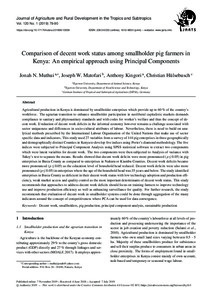Comparison of decent work status among smallholder pig farmers in Kenya; An empirical approach using Principal Components
| dc.date.accessioned | 2019-11-11T17:10:46Z | |
| dc.date.available | 2019-11-11T17:10:46Z | |
| dc.date.issued | 2019-11-07 | |
| dc.identifier | doi:10.17170/kobra-20190613559 | |
| dc.identifier.uri | http://hdl.handle.net/123456789/11344 | |
| dc.description | Gedruckte Ausg. im Verlag Kassel Univ. Press (www.upress.uni-kassel.de) erschienen. | ger |
| dc.language.iso | eng | eng |
| dc.rights | Urheberrechtlich geschützt | |
| dc.rights.uri | https://rightsstatements.org/page/InC/1.0/ | |
| dc.subject | decent work | eng |
| dc.subject | smallholders | eng |
| dc.subject | pig production | eng |
| dc.subject | principal component analysis | eng |
| dc.subject | sustainable production | eng |
| dc.subject.ddc | 630 | |
| dc.title | Comparison of decent work status among smallholder pig farmers in Kenya; An empirical approach using Principal Components | eng |
| dc.type | Aufsatz | |
| dcterms.abstract | Agricultural production in Kenya is dominated by smallholder enterprises which provide up to 60% of the country's workforce. The agrarian transition to enhance smallholder participation in neoliberal capitalistic markets demands compliance to sanitary and phytosanitary standards and with codes for worker's welfare and thus the concept of decent work. Evaluation of decent work deficits in the informal economy however remains a challenge associated with sector uniqueness and differences in socio- cultural attributes of labour. Nevertheless, there is need to build on analytical methods prescribed by the International Labour Organisation of the United Nations that make use of sector specific data and indicators. This study used 27 variables from a survey of 144 pig enterprises in three geographically and demographically distinct Counties in Kenya to develop five indices using Porter's diamond methodology. The five indices were subjected to Principal Component Analysis using SPSS statistical software to extract two components which were latent variables for decent work. The two components were then subjected to Analysis of variance with Tukey's test to separate the means. Results showed that decent work deficits were more pronounced (p ≤ 0.05) in pig enterprises in Busia County as compared to enterprises in Nakuru or Kiambu Counties. Decent work deficits became more pronounced (p ≤ 0.05) as the education level of household head reduced. Decent work deficits were also more pronounced (p ≤ 0.05) in enterprises where the age of the household head was 35 years and below. The study identified enterprises in Busia County as deficient in their decent work status with low technology adoption and production efficiency, weak market access and quality control as the most important determinants of decent work status. This study recommends that approaches to address decent work deficits should focus on training farmers to improve technology use and improve production efficiency as well as enhancing surveillance for quality. For further research, the study recommends that evaluation of decent work in smallholder systems could be done through aggregation of the many indicators around the concept of competitiveness where PCA can be used for data convergence. | eng |
| dcterms.accessRights | open access | |
| dcterms.creator | Muthui, Jonah N. | |
| dcterms.creator | Matofari, Joseph Wafula | |
| dcterms.creator | Kingori, Anthony | |
| dcterms.creator | Hülsebusch, Christian | |
| dc.type.version | publishedVersion | |
| dcterms.source.identifier | ISSN 2363-6033 | |
| dcterms.source.issue | No. 1 | |
| dcterms.source.journal | Journal of Agriculture and Rural Development in the Tropics and Subtropics (JARTS) | eng |
| dcterms.source.pageinfo | 79-90 | |
| dcterms.source.volume | Vol. 120 |
Dateien zu dieser Ressource
Das Dokument erscheint in:
-
Vol 120, No 1 (2019) [11]

